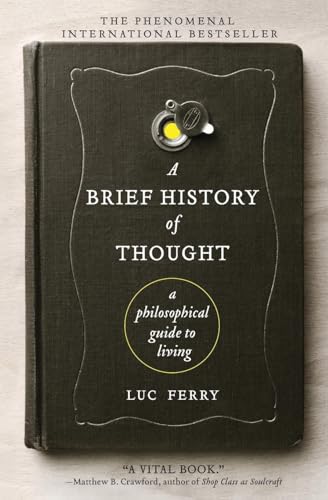A Brief History of Thought
A Philosophical Guide to Living (Learning to Live)
Luc Ferry
BOOK REVIEW

In a world where we constantly bombard ourselves with information, A Brief History of Thought: A Philosophical Guide to Living by Luc Ferry emerges as a beacon of clarity and wisdom. This powerful work distills the thoughts of humanity's greatest philosophers, guiding readers through the labyrinth of existential questions that have haunted mankind for centuries. As you turn each page, you'll find a compelling invitation to explore the depths of your own beliefs and the essence of what it means to live a meaningful life.
Ferry's approach is unlike the dense academic tracts that often alienate rather than inspire. He takes complex philosophical ideas and presents them through a conversational lens, making profound insights accessible for everyone. This is not merely a text for philosophy majors; it's for anyone who has ever paused at a crossroad of life, pondering larger questions about existence, happiness, and purpose. By weaving the wisdom of great thinkers like Socrates, Plato, Rousseau, and Nietzsche into a coherent narrative, Ferry transforms their abstract theories into practical life lessons that resonate today.
The historical backdrop of A Brief History of Thought is tumultuous and transformative. As you delve into the text, you are swept into the swirling currents of Western philosophy, from ancient Greece to modernity. The Enlightenment and its radical ideas jump from the pages, urging you to confront the structures of society and the innate desire for personal freedom. Ferry brilliantly highlights how these philosophical movements shaped not only our intellectual landscape but our daily lives-disrupting traditions, sparking revolutions, and igniting the relentless pursuit of knowledge.
By engaging with Ferry's work, you're prompted to ask yourself: What do I truly believe? What is my place in a society that often seems chaotic? These questions can feel overwhelming, but Ferry's exploration offers an illuminating compass. His insights into human happiness and the nature of evil challenge you to confront your understanding of morality and joy. You might find yourself reflecting on the age-old tension between individual desires and collective duty, as Ferry poignantly dissects the ideals of altruism versus hedonism.
Many readers have lauded Ferry's engaging writing style and approachable philosophy. They have praised the way he manages to evoke introspection without veering into pretentiousness. This is a book where you can mark lines and write notes in the margins, turning it into a personal map of your philosophical journey. Critics, however, have pointed out that some may find his interpretations of certain philosophers less rigorous than traditional academic discussions. But perhaps that's the very beauty of this work-Ferry transforms the dense jungle of philosophy into a garden, inviting everyone to wander and wonder.
Imagine walking through this garden, each flower representing a different intellectual shift. Every chapter uncovers rich dialogue about the significance of thought in guiding the way we live our lives. You'll find yourself questioning societal norms and redefining your aspirations. There's an electrifying energy as you embrace the sheer scope of human thought and experience, breathing life into the dusty philosophical texts that line the shelves of academia.
What sets A Brief History of Thought apart is its courage to tackle profound topics while remaining rooted in the everyday. The intertwining of theory and practicality weaves a tapestry that celebrates the human spirit, perfectly positioning this work in the canon of modern philosophy. Luc Ferry urges us not just to think but to live intentionally-seeking joy, compassion, and understanding in a world that sometimes seems devoid of them.
Ferry's insights resonate across cultures and time periods, striking a chord with readers who come from diverse backgrounds. Influential political thinkers and societal reformers throughout history have often drawn upon philosophical principles to instigate change, showcasing how the musings of the past fuel movements today. The frenetic pace of modern life risks erasing these vital connections, but with this book, you reclaim that intellectual heritage. It's a stark reminder: to understand ourselves, we must first explore the thoughts of others.
As you venture deeper into the pages, don't be surprised if you feel an urgency to share your newfound insights with friends, to challenge them with these diverse perspectives. A Brief History of Thought achieves something rare: it inspires a communal quest for understanding, a collective yearning to grasp the complexities of existence.
In the end, this book isn't merely about learning philosophy; it's an awakening, a call to action that dares you to live with purpose and engage with your choices actively. Don't let this opportunity slip through your fingers. Dive into the philosophical ocean that Luc Ferry presents and emerge transformed, armed with knowledge and an invigorated spirit ready to tackle the wonders and woes of life. 🌍✨️
📖 A Brief History of Thought: A Philosophical Guide to Living (Learning to Live)
✍ by Luc Ferry
🧾 304 pages
2011
#brief #history #thought #philosophical #guide #living #learning #live #ferry #LucFerry